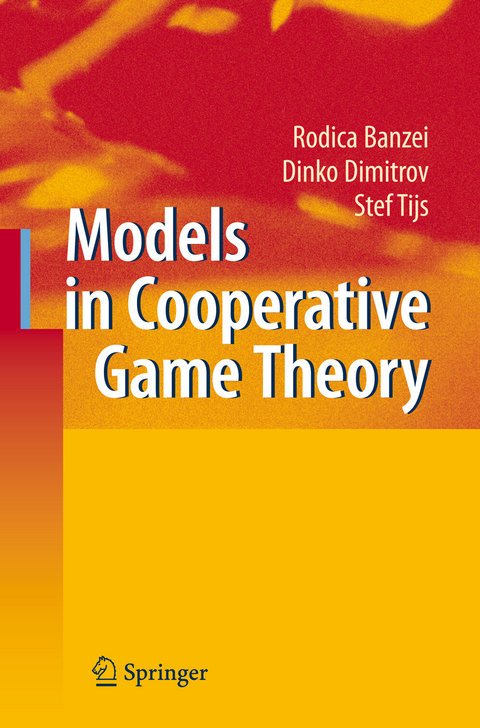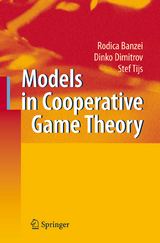Models in Cooperative Game Theory
Springer Berlin (Verlag)
978-3-540-77953-7 (ISBN)
Cooperative Games with Crisp Coalitions.- Preliminaries.- Cores and Related Solution Concepts.- The Shapley Value, the ?-value, and the Average Lexicographic Value.- Egalitarianism-based Solution Concepts.- Classes of Cooperative Crisp Games.- Cooperative Games with Fuzzy Coalitions.- Preliminaries.- Solution Concepts for Fuzzy Games.- Convex Fuzzy Games.- Fuzzy Clan Games.- Multi-Choice Games.- Preliminaries.- Solution Concepts for Multi-Choice Games.- Classes of Multi-Choice Games.
From the reviews:
"This small book can be very interesting for readers who want to study further generalizations of the classical topic on cooperative games. It investigates the classical cooperative games with transferable utility and some game models in which the players have the possibility to cooperate partially, that is, fuzzy games and multichoice games. The book is written very clearly, being a rich review of the most essential notions and theorems (with proofs) in these topics." (Tadeusz Radzik, Zentralblatt MATH, Vol. 1079, 2006)
From the reviews of the second edition:
"This is the second edition of the highly regarded monograph on cooperative games by Branzei, Dimitrov and Tijs. ... The 128 references add to the value of the presentation. This monograph will bring the reader to almost everything currently known about cooperative games with transferable utility in coalition form." (Roy Gardner, Zentralblatt MATH, Vol. 1142, 2008)
"This book deals with cooperative game theory, probably the most important class of game in game theory. ... The book is concise. In each part a goal is proposed and developed without digressions or comments. Finally, the book provides a wide-ranging bibliography where the different aspects can be found treated in depth. For all these reasons, I find the book an appealing guide for researchers and practitioners in cooperative game theory with fuzzy coalitions or multi-choice cooperative games." (Pedro Miranda, Mathematical Reviews, Issue 2012 a)
From the reviews:"This small book can be very interesting for readers who want to study further generalizations of the classical topic on cooperative games. It investigates the classical cooperative games with transferable utility and some game models in which the players have the possibility to cooperate partially, that is, fuzzy games and multichoice games. The book is written very clearly, being a rich review of the most essential notions and theorems (with proofs) in these topics." (Tadeusz Radzik, Zentralblatt MATH, Vol. 1079, 2006)From the reviews of the second edition:"This is the second edition of the highly regarded monograph on cooperative games by Branzei, Dimitrov and Tijs. … The 128 references add to the value of the presentation. This monograph will bring the reader to almost everything currently known about cooperative games with transferable utility in coalition form." (Roy Gardner, Zentralblatt MATH, Vol. 1142, 2008)“This book deals with cooperative game theory, probably the most important class of game in game theory. … The book is concise. In each part a goal is proposed and developed without digressions or comments. Finally, the book provides a wide-ranging bibliography where the different aspects can be found treated in depth. For all these reasons, I find the book an appealing guide for researchers and practitioners in cooperative game theory with fuzzy coalitions or multi-choice cooperative games.” (Pedro Miranda, Mathematical Reviews, Issue 2012 a)
| Erscheint lt. Verlag | 28.3.2008 |
|---|---|
| Zusatzinfo | XII, 204 p. |
| Verlagsort | Berlin |
| Sprache | englisch |
| Maße | 155 x 235 mm |
| Gewicht | 505 g |
| Themenwelt | Wirtschaft ► Allgemeines / Lexika |
| Wirtschaft ► Volkswirtschaftslehre | |
| Schlagworte | Addition • Agents • average • Cooperation • Cooperative games • cooperative game theory • Finite • fuzzy • Fuzzy games • Games • Game Theory • Layers • Multi-choice Games • SET • Spieltheorie (mathemat.) |
| ISBN-10 | 3-540-77953-1 / 3540779531 |
| ISBN-13 | 978-3-540-77953-7 / 9783540779537 |
| Zustand | Neuware |
| Informationen gemäß Produktsicherheitsverordnung (GPSR) | |
| Haben Sie eine Frage zum Produkt? |
aus dem Bereich




